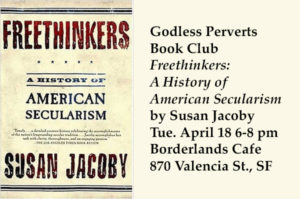


It neither picks my pocket nor breaks my leg.” She enlists Abe Lincoln in the secularist roll, although some scholars will object. Jacoby examines the opaque religious beliefs of the Founders, recalling that Jefferson excited opposition in the 1800 presidential campaign for his apparent indifference to religion, as well as his remark that “it does me no injury for my neighbor to say there are twenty gods, or no God. Jacoby hails Thomas Paine as our exemplary “revolutionary secularist,” omitting God whenever he could as certain compatriots in the new US worried that unless the chief executive took an oath to some organized Protestant church, “a Turk, a Jew, a Roman Catholic, and what is worse than all, a Universalist, may be President of the United States,” as one speaker at the Massachusetts constitutional convention put it. Bless their innocent souls, those six presidents took the constitutional separation of church and state seriously, even as a couple of them-Jefferson and Madison-harbored deistic notions (God may not be dead, but he’s probably not well) that weighed against their invoking the divinity.

“The first six presidents of the United States did not invoke the blessings of the deity as frequently in their entire public careers as President Bush does each month,” writes freelance journalist Jacoby ( Half-Jew, 2000). A lively history of American antispiritualism, with a stellar cast.


 0 kommentar(er)
0 kommentar(er)
